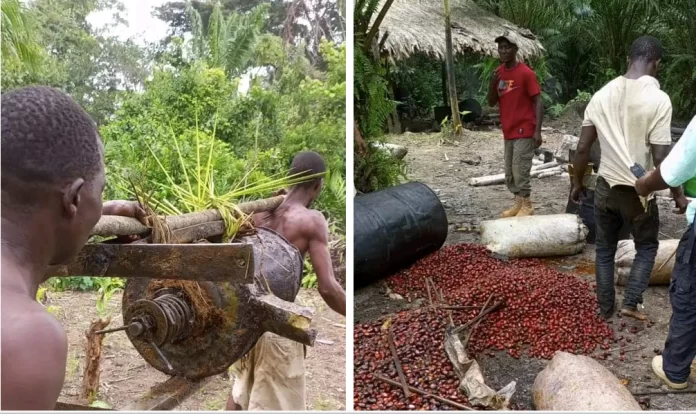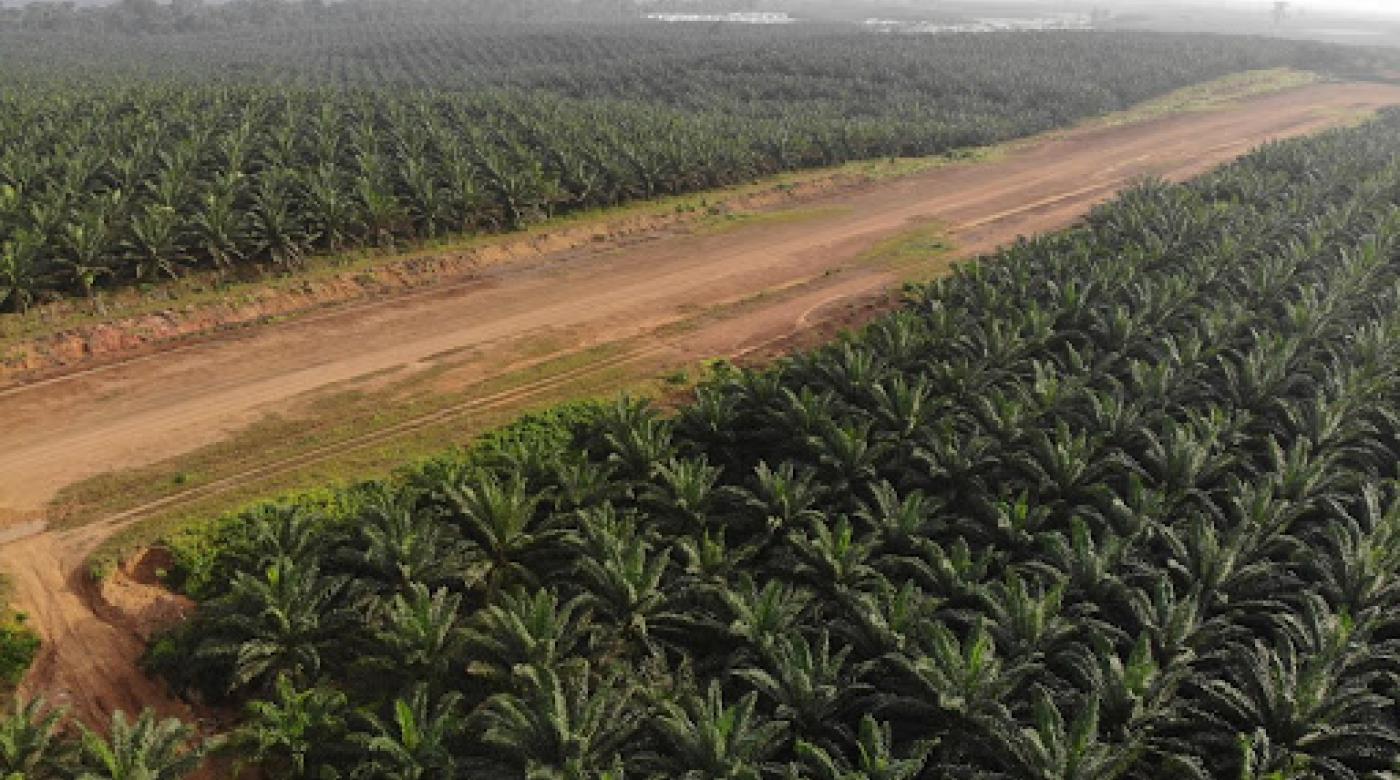
Things were about to change for Lincoln Weah and his friends but he did not know.
It was July 7, 2022. Weah had just returned from setting up his palm oil production worksite in a palm farm around the Bellehful village. Suddenly, a group of guards of Golden Veroleum Liberia (GVL) and armed police arrested him.
Wearing palm-oil-stained clothes, they accused Weah of stealing palm nuts from GVL’s plantation and demanded he took them to the worksite.
“When we reached there, they began to beat me, forcing me to call the names of my friends in the village,” Weah tells The DayLight. “They promised that when I showed the people who are making palm oil on the farm, they would let me go.”
Weah believed the guards and police officers and named his three workmates. But it was a trick. As soon as he disclosed their names, the beating intensified, according to Weah. A picture obtained from the NGO Sustainable Development Institute (SDI) shows the 32-year-old sitting on the blackened ground of the worksite, surrounded by guards and policemen. Other pictures show metal drums of palm nuts, the men carrying a handheld palm mill and Weah detained by a police officer.
They led Weah back to Belleh-ful and arrested the other men, who had been there all long. He, Shelton Wawoe, Tolou Kamara and Timothy Tarpeh were shoved in a vehicle and taken to jail in Butaw. Not long after Moses David, 43, a GVL worker and owner of the farm the suspects produced palm oil, joined them.
The arrest is the beginning of a series of ordeals the men face that continues today: prolonged pretrial detention, loss of properties and a threat to their livelihood. David risks a possible forfeiture of his benefits for a decade of service to GVL.
‘They stopped us’
Following their arrest, four of the men spent five nights inside the police cell. They were later transferred to the Central Prison in Greenville, according to the men and court records. The other man was transferred the next day, the records show.
“Since we were arrested and beaten, I am not feeling well in my body. Sometimes when I wake up, my knees and the rest of my joints can be sticking. I do not have money to go to the hospital,” Weah tells this reporter.

Drone photo by[The Day Light]
“They stopped us from getting medicine,” says Wawoe, 55, the oldest of the men.
Detaining a person beyond 48 hours without charge is a violation of their rights, according to Liberian Constitution. Diggs Drunwille, Sr., the police commander of Sinoe County declined to comment on the matter. A GVL spokesman justified the actions of the guards and police.
“GVL has the responsibility to protect its personnel, properties and rights utilizing legal means, including the involvement of police and other authorities where appropriate,” Alphonso Kofi, tells The DayLight in an email.
Weah, Tarpeh, Wawoe and David were released on bail on July 13, according to documents from the Kaisieh Magisterial Court in Butaw. Kamara, a Sierra Leonean, remained there until October, as no one filed his bond. The court release him only after local rights campaigners and townspeople intervened.
One day after their release, the men were charged with theft of property. They are accused of using a motorcycle to steal loose palm nuts worth US$1,550, court documents show. The police seized six containers, four metal drums and other items from their worksite. All five men deny any wrongdoing.
In separate interviews, the suspects allege that the guards and police made away with their money and other belongings. Wowoe says he lost L$120,000, US$650 and a cell phone that costs US$150. David claims he lost US$600, mattresses, clothes and other properties during his arrest.
GVL has, meanwhile, suspended David, who works as a fieldworker for the company. Theft is a ground for the termination of an employee’s contract under the Decent Work Act. David’s suspension came nine months after GVL paid off 16 of its workers over their wrongful dismissals in October 2021.
David accused GVL was trying to deprive him of years of service to the Indonesian company. Kofi refutes David’s accusation. He says his suspension had nothing to do with severance pay. “His suspension is dependent on the court’s ruling,” Kofi says.
The accused men say they are finding it difficult to survive. They have been prevented from going back to the site, according to them. Kofi dismisses these allegations.
David owns the two-acre palm farm where the accused men worked. The farmland lies between an abandoned plantation owned by Equatorial Palm Oil (EPO) and GVL’s Butaw plantation. Known in the oil palm industry as an out-grower, villagers’ farms are an important part of a plantation’s development. It is one of the principles that govern the Roundtable on Sustainable Palm Oil (RSPO), the watchdog for the commodity globally.
GVL has a 65-year agreement with the Liberian government for 220,000 hectares in Sinoe and Grand Kru and Maryland Counties. The 2010 deal was worth US$1.6 billion.
It is Liberia’s largest producer of crude palm oil, exporting US$31.7 million worth of the commodity between 2020 and 2021, according to the Liberia Extractive Industries Transparency Initiative (LEITI). However, land-grab, deforestation and labor offenses have marred the concession for its 13 years.
Golden Veroleum Liberia (GVL) has an agreement with Liberia to covers 220,000 hectares of land in Sinoe, Grand Kru and Maryland. The DayLight/Derick Snyder
Slow Case
The magisterial court has not heard the case yet. It has postponed the proceedings several times, in July, October, December, January and February, court documents show.
Moses Karnuah, who stood the bond for Weah, Wawoe, Tarpeh and David, says the delay was taking a toll on him.
“Everyone has an activity to attend to,” Karnue told the reporter,” Karnuah, 45, says. “When the people I stood for are not here, the court will hold me responsible, or I will go to jail. I want the case to… reach the final decision, then I will be free.”
“This is giving us hard time to do other things for ourselves,” Weah says, via phone on his way back to Butaw from Saclepea, Nimba County.
The case has been rescheduled from February 1 to a later date.
This story was originally published by The DayLight and has been republished here by permission.





















